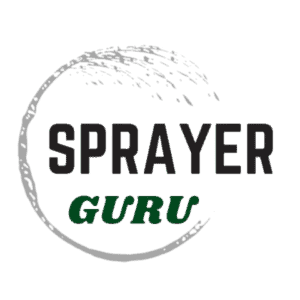Garden enthusiasts and lawn caretakers are continuously on the lookout for eco-friendly and safe alternatives for maintaining their green spaces. One such alternative that has piqued much interest is vinegar. Known for its cleaning and disinfecting properties, vinegar is also making its way into lawn and garden care.
Anyone looking to use vinegar on their lawn or garden will need to know what kind of sprayer they can use to apply it. Today we will look at the types of sprayers to use for vinegar and the effect vinegar can have on a sprayer.
What Type of Sprayer Can Handle Vinegar?
If you desire to use vinegar in a lawn or garden sprayer, there are a few considerations you should keep in mind regarding the compatibility of sprayers with vinegar, the effects of vinegar on sprayers, and how different dilutions affect the potency of vinegar.
Vinegar’s acidic nature can cause corrosion, particularly on metal parts of a sprayer. This corrosion can lead to a reduction in the lifespan and effectiveness of the sprayer. It’s particularly advised to avoid using spray equipment with metal working parts such as metal trigger wands, metal pump assemblies, or metal nozzles when spraying vinegar.
Non-metal materials are best suited for use with vinegar. Specifically EPDM rubber or nylon hose, polyethylene tanks, poly or nylon wands, and Viton seals.
It is also important to consider that a diluted mixture of vinegar and water will have less corrosive effects on a sprayer. Most Vinegar products on the market contain 25 percent or less of vinegar and the rest is water. The more diluted a mixture, the less effect it will have on the sprayer components.
Can You Put Vinegar In a Pump Sprayer?
Yes, vinegar can be used in a pump sprayer. I have used vinegar on occasion in a Solo hand pump sprayer with no issues. The sprayer is constructed with all plastic/poly components except for the spring in the trigger wand which does not contact the liquid.
Similar to any other sprayer, it’s crucial to choose one made of materials that can withstand the acidity of vinegar. As discussed above, metal is not an ideal match for vinegar. Fortunately, the vast majority of hand pump sprayers are made of poly, nylon, rubber, etc. These components hold up to the acidity and chemical nature of vinegar much better than metals like aluminum, brass, or iron.
If you have a non-metal hand pump sprayer you use for other applications, you can be confident that using it to spray a diluted mixture of vinegar and water will be ok. Just be sure to thoroughly rinse the sprayer after using it.
Can You Put Vinegar in a Backpack Sprayer?
You can also put vinegar in a backpack sprayer. The guidelines are the same as they would be for hand pump sprayers. Poly, EPDM, Viton, Nylon, and Viton are the materials best suited for use with vinegar, and rinsing after each use is vital.
Will Vinegar Damage a Lawn and Garden Sprayer?
It is possible that vinegar can cause damage to a lawn or garden sprayer. However, if you are using the right type of sprayer and following the correct cleaning/rinsing procedure then the effects should be minimal.
When you introduce an acidic substance like vinegar into a sprayer with metal parts, the acidic nature of vinegar can accelerate the corrosion process. Vinegar’s acetic acid can react with the metal, leading to the formation of metal acetates and releasing hydrogen gas. This reaction eats away at the metal over time, thinning the metal parts, and eventually causing them to fail.
The severity of corrosion depends on several factors including the concentration of acetic acid in the vinegar, the duration of contact, the type of metal, and the presence of other corrosive agents.
In garden sprayers, metal parts like nozzles, hoses, or fittings are susceptible to corrosion when they come into contact with vinegar. This is why it’s advisable to use sprayers with vinegar-resistant seals and materials like EPDM rubber, Viton rubber, polyethylene, or stainless steel which are more resistant to corrosion compared to ordinary steel or iron.
Reducing Effects of Vinegar on Sprayers
The best way to mitigate any effects on your sprayer when using vinegar is to thoroughly rinse out and flush the sprayer.
This is done by filling your sprayer with about 1/3 full of fresh water. Pump it up and spray the fresh water through the entire system for about 30 seconds. Then dump out the water and refill it again Repeating this process two more times.
This is known as a triple rinse method. You can view more details and another message to completely and thoroughly clean your sprayer in this post about cleaning your sprayer when switching between different products.
Safety Precautions When Spraying Vinegar
You should also take precautions when using vinegar in a sprayer. Household Vinegar is usually a 5% concentration of acetic acid. This is generally considered safe for typical culinary and cleaning uses, however, higher concentrations of vinegar (10-25 percent or more), found in horticultural vinegar products, can cause skin irritation or eye damage and should be handled with appropriate personal protective equipment, including gloves and eye protection
Conclusion
Vinegar presents an eco-friendly alternative for certain lawn and garden care needs. Spraying vinegar it’s possible with many common lawn and garden pump sprayers and backpack sprayers however it is important to ensure that they are constructed with materials that will hold up to vinegar. Especially if you were using concentrated solutions and spraying them often.
Remember that Choosing the right sprayer and rinsing it thoroughly after Using it will help ensure That your sprayer lasts. It’s also important that you are mindful of where are you spraying and use proper protective equipment as concentrated vinegar solutions can pose a threat to skin or eyes.

